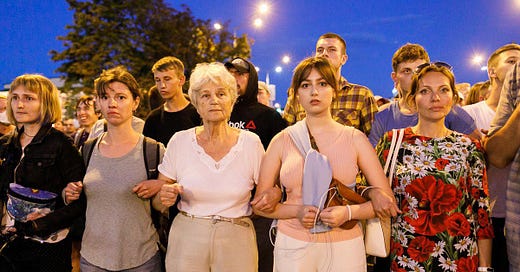Photo: Olga Shukailo, Tut.By | Catch up: Belarus in 120 seconds.
It took almost a week for historic demonstrations against a rigged election in Belarus to make waves in the international community. When they did, American commentators were full of dire warnings about the Lukashenka regime's brutal crackdown against peaceful protesters. Watch what's happening in Belarus, they intoned, because it could be the US in November.
These warnings are misplaced. American democracy is undoubtedly ailing, but we are not yet practiced in the art of imprisoning our political opponents. In Belarus, Lukashenka denied ballot access to his main challengers, throwing them in jail on trumped up charges prior to the election.
Americans can still safely cast their votes and reasonably expect they will be fairly and accurately counted. In Belarus, independent election observers analyzed over half a million ballots and found that Lukashenka’s claim he received over 80% of the vote is statistically impossible.
When Americans worry about the sanctity of our votes, as we have done since we learned of the Trump administration’s plans to undermine the US Postal Service, we can express our discontent — online, on paper, in protest — and encourage our institutions to do their job. Though they are hobbled in the Trump era, Congress and the courts continue to provide checks and balances against presidential power. In Belarus, the primary function of these instiutions is to prop up a dictator.
Put more succinctly: we enjoy freedoms that, for more than a quarter of a century, Belarusians could only imagine.
Others have recast Belarusians' bravery as part of a geopolitical struggle, describing Belarus as a geopolitical football between Russia and the West, between autocracy and democracy, between darkness and light. Trump's relative silence on the matter, they say, is because he has received orders from Vladimir Putin not to support Belarus. Unsurprisingly, authorities in both Belarus and Russia have claimed that Belarusian protesters are supported by foreign governments. Just today, Russian Foreign Minister Sergei Lavrov asserted that for the West, “this is not about Lukashenka, human rights and democracy. It's all about geopolitics. About the very rules that our Western partners want to implement in everyday life on our continent and in other parts of the world.” Lavrov, Lukashenka, and Western policymakers who see Belarus as a bargaining chip ignore the fact that the leaders of the opposition want to continue to pursue a multi-vector foreign policy, balancing relations with Russia, the European Union, and the United States.
What all of these narratives do is rob Belarusians of the agency their government has denied them for 26 years. We should be inspired by Belarusians’ acts of bravery, of humanity, but we should not claim their struggle as our own. Their fight is admirable in its simplicity, and that's what should hearten us and spur our own action: voices heard, votes counted, democracy -- for the people, by the people -- in the making.
My book has been out in the wild for six weeks! Thanks to those who have picked up a copy. If you enjoyed it, consider leaving a review on Amazon or Goodreads. I’ve been delighted to have a lot of incredibly interesting conversations about the book and my work more broadly. Here are a few to check out:
NPR’s All Things Considered: I joined Leila Fadel for an in-depth discussion of some of the misconceptions about disinformation and what we can all do as we count down to Election Day.
Modern Wisdom with Chris Williamson: if you’re interested in a conversation about Russian disinformation that isn’t hopelessly bleak and you also happen to like a light northern English accent, this one’s for you.
The KennanX Podcast with Jill Dougherty: a well-produced overview of Russian ops in Central and Eastern Europe from the Wilson Center with CNN’s former Moscow bureau chief.
No rest for the weary — I’ve also released two new publications in the past week:
For the US Army War College Quarterly, Parameters, Henry Collis and I look at how government must structure itself for “enduring information vigilance” to counter ongoing information operations in the post-COVID era.
For the Center for a New American Security’s election integrity series, I wrote about the threat of domestic disinformation in Poland.
Thanks, as always, for your support.




